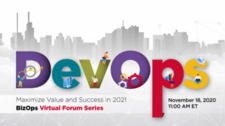Watch live: DevOps Virtual Forum spotlights emerging trends in the DevOps world

Limited Time Offer!
For Less Than the Cost of a Starbucks Coffee, Access All DevOpsSchool Videos on YouTube Unlimitedly.
Master DevOps, SRE, DevSecOps Skills!
Source:-https://siliconangle.com
Nearly 20 years ago, core principles of the DevOps movement were actually written down. That was when 17 software developers created the “Manifesto for Agile Software Development” and released it as a philosophy of teamwork and continuous delivery in February 2001. Those tenets remain very much a part of the DevOps culture today.
The desire to drive software growth and productivity moved DevOps front and center in today’s enterprise. And operations teams are helping to aid developers’ agile mantra with the ultimate goal of aligning development with an organization’s business side.
“We’ve seen how DevOps practices have minimized or even eliminated finger pointing between ‘Dev’ and ‘Ops’ teams,” said Dave Vellante, chief analyst at SiliconANGLE Media’s sister market research firm Wikibon and host of SiliconANGLE’s livestreaming video studio theCUBE. “People are now taking the next step and aligning software development with product development. This is critical, as in the coming decade, virtually every company will have a software element to its product roadmap.”
On Nov, 18, starting at 11 a.m. EST, theCUBE will provide inside coverage of the DevOps Virtual Forum, which spotlights emerging trends in the DevOps world. TheCUBE hosts will interview top executives from Broadcom Inc., Forrester Research Inc. and British Telecom Group PLC, with a focus on new capabilities in agile management, how organizations are pushing the envelope through the integration of product development and DevOps, and the use of cutting-edge automation tools to maximize value and efficiency. (* Disclosure below.)
Pandmic forces a move to ‘spiritual’ colocation
As an unforeseen pandemic forced organizations of all types and sizes to evolve quickly, many had to go remote overnight. The resulting virtual collaboration required laptop cameras and video conference technology to ensure seamless operations. This reality forced businesses to move from physical spaces to “spiritual” colocation.
“You can’t do that without having an even higher attention to automation and DevOps practices that enable it, but there’s also an increased focus on enabling digital collaboration,” said Jeffrey Hammond, vice president and principal analyst at Forrester, during a recent interview with theCUBE. “In 2020, every company is a remote development company.”
While the transition may have challenged developers, recent studies actually revealed that the development community is doing quite well. More than 50% of developers surveyed in the Harness “2020 State of Developer Satisfaction” report said they were happier in their roles since COVID-19 disrupted the world, and an astonishing 94% were overwhelmingly satisfied with the investment their companies were making in employee growth. And a GitHub report published in May revealed the activity of developer-generated pushes and pull requests has increased year-over-year.
But challenges still exist inside organizations, including the cultural alignment between DevOps and the product cycle. In October, the BizOps Coalition released a Manifesto that outlined a framework to bridge the gap between business outcomes and tech investment in DevOps. The bottom line: By connecting software development with the goals of a business and leveraging critical tools such as AI, organizations can create cultural change and eliminate wasted money while improving productivity.
“When we think about the major impediments for DevOps implementation, it’s all about culture,” said Serge Lucio, general manager of the Enterprise Software Division at Broadcom, during a recent interview with theCUBE. “It’s about who can do what and when and driving a bias toward action. There’s a great role that technology and AI can provide for a new level of collaboration.”